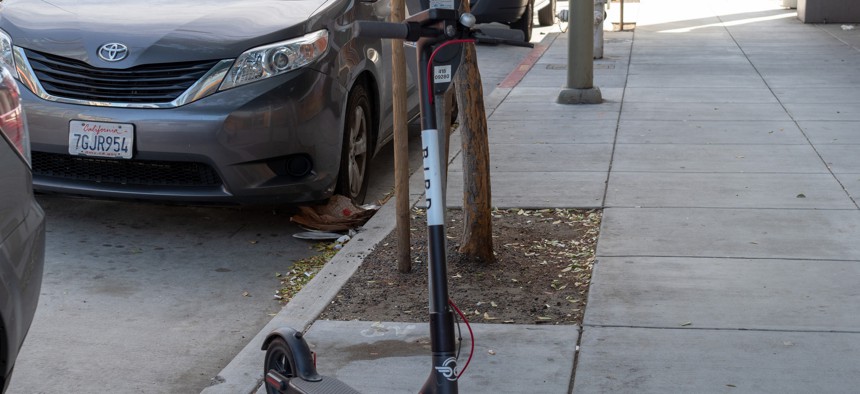In One City, Residents Found a New Use For Scooters: Penis Graffiti

istock.com/David Tran
The vulgar drawings, made by tire skid marks, began appearing in Topeka, Kansas, shortly after the city partnered with Bird scooters on a pilot program.
Three months after Bird scooters launched a pilot program in Topeka, Kansas, some riders have found a creative use for the public-share transportation: using the tires to leave skid marks in the shape of penises.
It is, the company said, a unique problem.
“We just haven’t seen that in other markets, with the vandalism,” Adam Davis, government partnership manager for Bird, told the Topeka City Council at a recent meeting. “I, personally, don’t know why somebody would find entertainment in destructing property like that.”
Davis offered a number of solutions to the problem, including geofencing the high-vandalism areas, a technological boundary that gradually slows the scooters to a stop once they move inside the restricted zone, preventing users from leaving marks with the tires. Davis also proposed restricted hours and lower speed limits for scooters in downtown Topeka, where the majority of the graffiti has occurred.
“What we’ve been able to decipher from looking at the data is that this is typically happening in the later hours,” he said. “We’ll continue to work and identify those high-skid-mark areas.”
The company has suspended a number of rider accounts after identifying likely culprits, he added. The local police department is also able to investigate and prosecute individual vandalism cases, though privacy laws would require a subpoena to obtain user information. There are no active investigations, the city manager said.
The company might eventually be able to deploy new technology to stop the graffiti, Davis said, when it debuts an updated version of its scooters at a future date. But an ongoing microchip shortage caused by the pandemic has left 50,000 of the vehicles on backorder.
“Those don’t allow for the black marks you’d see from others,” he said. “Until we get to a point where we can get them here, we just don’t have the technology to swap out the wheels.”
Council Member Mike Lesser pressed that point, asking why the company couldn’t simply add the non-marking wheels to the existing scooter model. Davis said it would ultimately be more expensive than installing the newer models, and would likely take longer than simply waiting for the updated scooters to become available.
Lesser, frustrated, said he hoped the scooter program would be successful in Topeka but was discouraged by the cost-analysis reason for dismissing what he saw as a quick fix to the graffiti problem.
“I’m sick and tired of getting these phone calls,” he said. “That being the case, I hope it works. I hope the geofencing works. I hope you’ll consider the wheel deal. Make no mistake about it, if our law enforcement has to start spending time to identify these people … then this will go away.”
Topeka’s contract with Bird began April 1 and runs through October 2022, though either side can terminate the agreement with 30 days’ notice, according to city documents. The company paid the city $500 to establish the pilot program, along with an ongoing fee of 15 cents per ride per scooter per day.
Other Issues to Address
The city council raised other concerns about the scooters, including reckless driving, underage riders and discarded vehicles blocking sidewalks and wheelchair ramps. The proposed solutions for the skid marks, along with an emphasis on rider education messages and age verification inside the Bird smartphone app, should also address those problems, Davis said.
“We’re not naive to the fact that we have had some issues, and I do want to stress that this is pretty normal any time you launch in a new city,” he said. “We’re taking action to address that. This isn’t a one-time, final action that will solve everything. It’s a process, and we will continue to examine, and look, and see where the deficiencies are, and then go from there.”
Kate Elizabeth Queram is a senior reporter for Route Fifty and is based in Washington, D.C.
NEXT STORY: The Everglades Experiment: Florida’s First ‘Incentivized’ Prison Redefines Punishment





